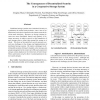119
Voted
HOTOS
2003
IEEE
15 years 8 months ago
2003
IEEE
Distributed writable storage systems typically provide NFS-like semantics and unbounded persistence for files. We claim that for planetary-scale distributed services such facilit...
134
Voted
STORAGESS
2005
ACM
15 years 8 months ago
2005
ACM
As enterprise storage needs grow, it is challenging to manage storage systems. The costs of locally managing, supporting, and maintaining resilience in storage systems has skyrock...
129
Voted
STORAGESS
2005
ACM
15 years 8 months ago
2005
ACM
Recently, the Network-Attached Secure Disk (NASD) model has become a more widely used technique for constructing large-scale storage systems. However, the security system proposed...
141
Voted
SIGMETRICS
2005
ACM
15 years 8 months ago
2005
ACM
I/O consolidation is a growing trend in production environments due to the increasing complexity in tuning and managing storage systems. A consequence of this trend is the need to...
116
Voted
SISW
2005
IEEE
15 years 8 months ago
2005
IEEE
Traditional storage systems have considered security as a problem to be solved at the perimeter: once a user is authenticated, each device internal to the system trusts the decisi...
139
Voted
ICDCS
2006
IEEE
15 years 8 months ago
2006
IEEE
Distributed storage systems employ replicas or erasure code to ensure high reliability and availability of data. Such replicas create great amount of network traffic that negative...
106
Voted
CCGRID
2006
IEEE
15 years 8 months ago
2006
IEEE
Abstract— An efficient, accurate and distributed metadataoriented prefetching scheme is critical to the overall performance in large distributed storage systems. In this paper, ...
106
click to vote
NCA
2007
IEEE
15 years 9 months ago
2007
IEEE
As disk storage density increases and data availability requirements become ever more demanding, data replication is increasingly an indispensable feature of enterprise-class stor...
121
Voted
MSS
2007
IEEE
15 years 9 months ago
2007
IEEE
Storage systems manage quotas to ensure that no one user can use more than their share of storage, and that each user gets the storage they need. This is difficult for large, dis...
94
Voted
MSS
2007
IEEE
15 years 9 months ago
2007
IEEE
As storage systems grow larger and more complex, the traditional block-based design of current disks can no longer satisfy workloads that are increasingly metadata intensive. A ne...




